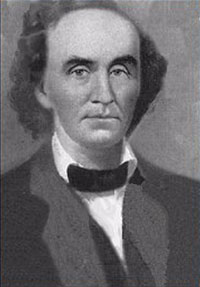
Claiborne Fox Jackson (1806-1862)
Claiborne Fox Jackson was born on April 4, 1806, in Fleming Co., Kentucky, to Dempsey Jackson and Mary Pickett. Claiborne, commonly called Claib, was the youngest of seven successive boys. Claib and brothers arrived in Missouri in the 1820's. His older brother, Dempsey Pickett Jackson, arrived in St. Louis as early as 1816. Claib Jackson emigrated to Missouri in 1822, raised a volunteer company, and served as its captain in the Black Hawk war. By the time Claib set foot in Franklin, Mo., county seat for Howard County, there were 10,860 residents. The Jacksons settled in the central Boon's Lick area, a region of prosperous counties lining the banks of the Missouri River.

Jackson practiced law, and for twelve years he was a member of the legislature, was Speaker of the House for one term (184446), was one of the originators of the present banking-house system of Missouri, and for several years was bank-commissioner. He later became a leader of the pro-slavery Democrats. He married well, three times to three different daughters of Sappington, a wealthy planter and entrepreneur. He was openly, even nakedly, ambitious, the sort of man who kept exacting accounts of every dime spent in support of his stepchildren (and he expected reimbursement), and one who cynically turned against his political mentor, Thomas Hart Benton, in a bid for his own advancement.
Claib Jackson had joined with David Rice Atchison and William Napton in the political arena and won election in the Senate over Thomas Hart Benton, Missouri's first Senator.
Missourians had not forgotten the trauma of their bid for statehood and rightly felt that the controversy over the expansion of slavery in the territories affected them more than any other slaveholders. Missouri's slaveowners feared being surrounded by a sea of free labor and perceived attacks on expansion as personal attacks on their honor. While Claib Jackson was not directly involved in the struggle for Kansas, he increased his slaveholdings and commitment to the peculiar institution during a period of political exile during the 1850s.
Jackson sensed that political winds in Missouri had shifted by 1859, and he announced himself as a Democratic candidate for governor. For as long as he possibly could, he avoided endorsing either Stephen Douglas or John C. Breckinridge for governor; finally, in a bid to attract moderate votes from St. Louis, he went for Douglas. That prompted a challenge from within his own party, but eventually he triumphed in a four-way contest, carrying 47% of the popular vote.
Jackson's support of Douglas and the Union was short-lived. As the secession crisis broke in the winter of 1860-61, Missourians for the most part sought a middle ground, deploring both secession and governmental interference. Jackson took the latter as his mandate and battle cry and used it to articulate a particular Missouri identity, one that was explicitly proslavery and that located the state on the Southern side.
Jackson proved to be more Confederate than most of his peers. While Missouri, at Jackson's urging, held a secession convention, it was dominated overwhelmingly by Unionists, voting ninety-eight to one to stay in the Union. That vote notwithstanding, Jackson continued to try to maneuver his state into joining the Confederacy by portraying himself as the state's greatest champion against federal power and by adopting a position of "armed neutrality."
Jackson attempted to arm the state militia from the federal arsenal in St. Louis but was frustrated by Francis P. Blair (1821-75) and Nathaniel Lyon. Lincoln's request for troops in April 1861 was refused by Jackson, who characterized the Union cause as an "unholy crusade."
When General Nathaniel Lyon broke up the secessionist rendezvous at Camp Jackson, Governor Jackson called out 5,000 militia and ordered them "to defend the state from invasion." On the approach of Lyon and his command, Jackson was forced to quit St. Louis and withdraw to southwst Missouri. Jackson, along with Gen. Sterling Price led the Missouri State Guard (MSG) into battle at Carthage on July 5, 1861. The MSG was victorious over a well armed and superior force of Federal troops led by Franz Segal. Gov. Jackson is the only sitting Governor to have led troops into battle. (Gov. Jackson is the only sitting Governor to have led troops into battle.)
When the convention, assuming constituent powers, deposed the state government in July, 1861, Jackson, at Neosho, convened an ineffective rump legislature. Jackson led the state into secession on October 28, 1861 and joined the Confederate States of America in November 1861. He then entered the Confederate army with the rank of brigadier-general, but was soon compelled by failing health to resign.
Governor Claiborne Fox Jackson died in Little Rock, Arkansas, from stomach cancer on December 6, 1862.